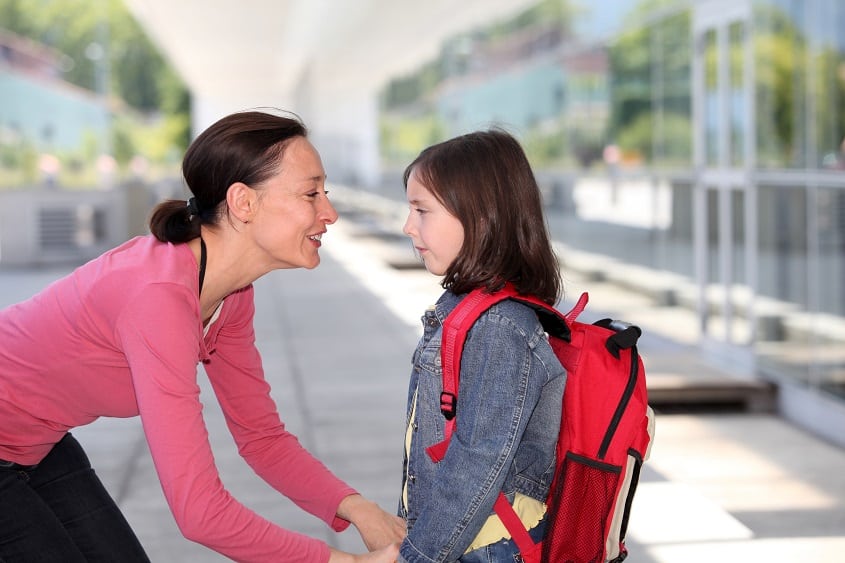Moving with children is stressful and emotionally difficult. Kids are saying goodbye to their friends and their home. This loss makes it hard for them to see the positive side, especially when it comes to going to a new school.
While Cassidy’s has moved thousands of families, we don’t pretend to be experts on children. But we do have some tips for you to help your children adjust to their new school, and in turn, their new home.
1. Be Positive
This is one of the most important things you can do to help your child to not only adjust to their new school, but to the move itself.

Free Ultimate Moving Checklist
Say goodbye to moving stress with our 2025 residential moving checklist for Canada—it’s the ultimate time-saver!
Download NowAccording to Marian Marion, PhD. and professor of early childhood education, children, particularly young ones, experience moving as a loss, which means they will experience sadness and anger, two emotions that are difficult to manage. This is when parents should step in, and help children acknowledge their feelings.
Tammy Gold, founder of Gold Parent Coaching, pointed out that children will feel the emotions that you emit. If they see you being negative about the move, or comparing new to old, they will do the same.
The best thing to do is maintain a positive attitude. Younger children will see you embracing these changes with a positive attitude, and with luck will adopt the same outlook.
Encourage this by talking with them about what they’re worried about, and giving them positive solutions. Psychologist Debbie Glasser, PhD. and past Chair of the National Parenting Education Network, recommends reminding your children about past successes they’ve had in new, sometimes scary situations.
For example, if they’re worried about making friends, remind them how easily they made friends when they first started school, or when they went to summer camp. Assure them that they are a wonderful friend who will meet new people before they know it.
Older children will benefit from positive reinforcement, but they will also pick up on when you’re faking it. After all, you might be having trouble adjusting to the move too, even if it is something you’ve been looking forward to.
The best way to encourage your older children to have a positive attitude is to show them that you feel sad sometimes too, and how you deal with your negative feelings constructively. You don’t mope, have tantrums, or slam the door because you don’t have any friends here and ‘your life is ruined!’
Instead, you find ways to make it work. You’ll call or write to your old friends while still trying to meet new people. Perhaps you express the fact that you miss your friends, but are looking forward to joining a local group or club and meeting new people. Gold recommends highlighting the benefits of your new home, or their new school.
Older children will see this positive, constructive process and reference it when they’re trying to make friends at their new school.
2. Make Sure They Know You’re a Team
No one wants to feel totally alone, especially after a move where chances are you don’t have any friends to rely on for support. Kids can feel even more alone, especially since they often don’t have a choice when it comes to moving.
That lack of control and isolated feelings can lead to more stress and negative feelings about moving to a new school. According to Nancy Darling, PhD. and a professor of psychology at Oberlin College, children experiencing these negative feelings can become inattentive, hyperactive, and act out. She says that the best way to help your kids is to make the process as easy for them as possible.
Tell your kids that above all, you are and always will be a team. Find some decisions that you’ll make together, like how they want their rooms set up, or what kind of decorations they want.
Once they feel like a part of the decision-making team at home, you can then focus on making sure that they know you’re a team at school, too.
For example, the experts at Education Corner recommend openly communicating about how the day is going to go.
It helps to have the day mapped out. Make sure they know where and what time you’ll pick them up at the end of the day. Having you actively invested in their school day will help ease their nerves.
Older children may not need that level of involvement, but you should still remind them that you’re there. Planning an after school activity, or even just setting time aside to talk with them, can be a huge help.
3. Visit the School
Often the scariest part of change is not knowing what it looks like. Moving to a new school you’ve never seen before is one of the scariest things for kids of all ages.
If it is possible to arrange a school visit before your child’s first day, this is a great way for them to become familiar with the space, the teachers, and the idea that they are going to a new school.
Start by touring around the outside of the school. If your younger children like the monkey bars or slides, make sure they see the playground. Your older children could be active in sports, so you’ll show them the facilities, and learn about the teams.
If you’re able to arrange a tour of the school itself, this could go a long way to make your children feel better.
Once inside, try taking your tour in the pattern of how the day is going to go. For example, this is where they’ll go in the morning, here’s how to get to the cafeteria for lunch, and this is where they’ll play or have free time. Going over ‘the route’ can help reduce confusion on the first day.
Tip: Don’t be afraid to ask questions. Brian McLeod, a principal in Ontario, recommends trying to get in touch with teachers and staff, and asking all the questions you need to. While it is harder in the summer, finding a teacher or two to talk to will give your kids a face to look for on the first day. It will also give them some extra information on the school, the classes, and things to expect.
Mysteries are fun to read, but not so much fun to experience. Taking the mystery out of a new school before the first day will help ease anxiety about not knowing what to expect.
4. Encourage Involvement
Making friends is a key part of child development, and according to Dr. Marion, children who move to a new school will often experience a mourning period for their friendships. This is because they do not feel as if they have social support in new groups, particularly if all of their new peers have long-standing groups.
One of the best ways to encourage new friendships is to get your children actively involved in their school and community through extracurricular activities.
If you move early enough in the summer, camps and summer clubs are a great way to introduce them to new people in the neighbourhood. They may even meet some fellow classmates that they can go to school with on the first day.
Once school starts, so will clubs and sports. Register your younger kids in activities that some of the people they meet are also doing.
Encourage your teenagers to sign up for one or two things that really interest them, particularly if it is something they didn’t have the opportunity to do in their last school.
Having a healthy mix of academics and extracurriculars will give them many opportunities to meet people. It will also keep them active, and more involved in their new community.
5. Have an Active Life Outside of School
Having an active life outside of school is just as important as being active in school. After all, a new school is important, but so is the new neighbourhood.
Make plans to do new, local things on the weekend. Is there a spot that everyone talks about, and is on all the must-visit lists about your new location? Take a Saturday and go do it. Even just a walk in a new part of town will get them out of the house and interacting with their surroundings.
6. Keep a Routine
With so much else changing, having a school routine can help give comfort to children who are already nervous about starting over. The experts at Pathways.org recommend maintaining any first day of school traditions, along with school routines. For example, if you make pancakes on the first day of school every year, continue to do so.
While not everything can stay the same, moving to a new school shouldn’t take away the beloved rituals. Even if it is something as simple as having their afternoon snack at the kitchen table while telling you about their day. You’ll all appreciate having a bit of familiar in a new setting.
We’ll Help Eliminate the Moving Stress
We can’t take away the new school jitters, but we can make your move as smooth as possible. We offer professional packing, moving, and shipping services that will make it easier for you and your family to focus on your new adventure.

